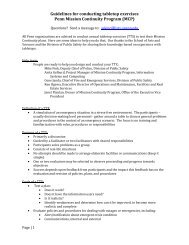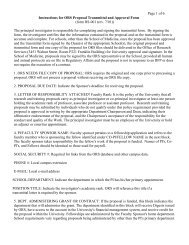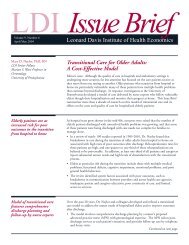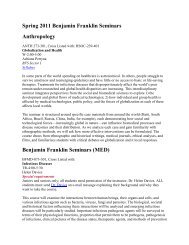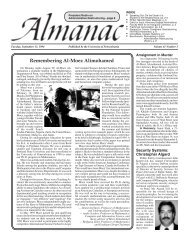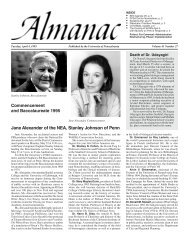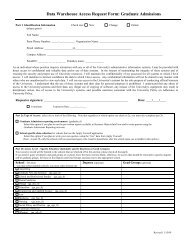No. 5 September 24, 1991 - University of Pennsylvania
No. 5 September 24, 1991 - University of Pennsylvania
No. 5 September 24, 1991 - University of Pennsylvania
Create successful ePaper yourself
Turn your PDF publications into a flip-book with our unique Google optimized e-Paper software.
On Forming Acquaintance Rape Policy<br />
Across the United States, campus-wide policy on acquaintance rape and<br />
sexual violence is needed now more than ever. As acquaintance rape grows<br />
to be the issue <strong>of</strong> the Nineties, colleges and universities are being relied<br />
upon by students, their parents and faculty to develop a comprehensive<br />
and proactive approach to addressing this salient issue. In order for our<br />
campuses to provide the safety that is expected, promised, and deserved,<br />
we must have sensitive and effective systems for safe reporting, support<br />
for victims/survivors, and adjudication <strong>of</strong> perpetrators. Most important,<br />
these systems need to be reflected in institutional policy and supported by<br />
well-coordinated procedures and adequate resources.<br />
The almost two-decade history <strong>of</strong> Penn’s response to rape, creating<br />
a safer campus and providing support to victim/survivors, sets the stage<br />
for the next step in realizing the <strong>University</strong>’s commitment to stop sexual<br />
violence. Penn’s proposed Policy on Acquaintance Rape and Sexual Violence<br />
emerged from the collaborative efforts <strong>of</strong> concerned faculty, staff and<br />
the leadership <strong>of</strong> a student-initiated and student-managed peer education<br />
group, Students Together Against Acquaintance Rape (STAAR). STAAR<br />
has been nationally recognized as a model program for the prevention <strong>of</strong><br />
acquaintance rape.<br />
The campus-wide Acquaintance Rape Working Group, mandated by<br />
President Hackney to oversee Penn’s response to acquaintance rape, is<br />
comprised <strong>of</strong> students, faculty and staff from all areas <strong>of</strong> the <strong>University</strong>.<br />
Its most notable accomplishment was the drafting <strong>of</strong> an acquaintance rape<br />
policy and procedures for its implementation.<br />
Faculty, staff and student members <strong>of</strong> the Acquaintance Rape Working<br />
Group will be presenting Penn’s comprehensive approach at two upcoming<br />
national conferences:<br />
— 1st International Conference: Sexual Assault on Campus, October 3-5,<br />
<strong>1991</strong>, Orlando, Fla.<br />
— Sixth National Conference on Campus Violence, February 6-8, 1992,<br />
Baltimore, Md.<br />
For information, or to schedule a workshop or classroom presentation, call<br />
STAAR at the <strong>of</strong>fice <strong>of</strong> Student Health Services, 662-7126.<br />
—Susan Villari, Health Educator<br />
Confidential Counseling on Rape<br />
The Penn Women’s Center <strong>of</strong>fers free confidential counseling to all<br />
members <strong>of</strong> the Penn community. If you or someone you know needs assistance<br />
regarding rape, including acquaintance rape or other sexual assault,<br />
or if you need counseling on other such personal issues, please call Alyce<br />
Jackson, Ph.D., or Robin Lynk, M.S., at 898-8611.<br />
—Penn Women’s Center<br />
On Graduate Studies<br />
The short article on page 9 <strong>of</strong> your May<br />
28th issue, is, so far as I know, the first<br />
public announcement at Penn concerning<br />
the new Mellon funding project for graduate<br />
studies. As a student in the English<br />
department and a recipient <strong>of</strong> funds from<br />
this program, I feel it important to comment<br />
on one important issue raised in that<br />
announcement.<br />
Your article declares the purpose <strong>of</strong> this<br />
program to be to “support improvements<br />
in the structure and organization <strong>of</strong> Ph.D.<br />
programs in the humanities,” which the<br />
Mellon Foundation says will be achieved<br />
by “lower[ing] the average time <strong>of</strong><br />
completion from the present eight years to<br />
five.” But in fact, there is much anecdotal<br />
evidence to support the contention that<br />
less time would not be conducive to future<br />
academic and pr<strong>of</strong>essional success.<br />
Dean Fitts, in your article, refers to a<br />
two-year study performed by the Mellon<br />
Foundation which is supposed to verify<br />
the program’s assumptions; yet that study,<br />
in my understanding, ignores crucial variables<br />
in the career <strong>of</strong> academics. It fails<br />
to correlate pr<strong>of</strong>essional success (tenure,<br />
publications, salary, teaching evaluations,<br />
committee appointments) with length <strong>of</strong><br />
time <strong>of</strong> graduate study, and specifically<br />
fails to demonstrate that brief school<br />
careers promote such success, or that long<br />
careers hamper it.<br />
Such a lack seems glaring because<br />
many <strong>of</strong> our most successful pr<strong>of</strong>essors,<br />
chairpersons, and even deans took<br />
much more than the “target time” <strong>of</strong><br />
five years to complete their studies.<br />
Indeed, a brief study <strong>of</strong> hiring in my<br />
department reveals that even our own<br />
recent faculty appointments, at both<br />
the junior and senior levels, have not<br />
tended to favor persons who completed<br />
their studies in a short period <strong>of</strong> time.<br />
Furthermore, it is clear that many <strong>of</strong> the<br />
most successful pr<strong>of</strong>essors in our department<br />
do not favor such a strong push<br />
toward a uniform five-year degree.<br />
Speaking Out<br />
Indeed, by favoring students with<br />
projects whose central virtue is their<br />
manageability, the grant threatens ideals <strong>of</strong><br />
thoroughness and intellectual responsibility<br />
on which the academy is built. It threatens<br />
to flood the market with candidates<br />
whose intellectual identities, to say nothing<br />
<strong>of</strong> their academic projects, have not met<br />
the tests <strong>of</strong> maturity which ensure depth<br />
<strong>of</strong> understanding and clarity <strong>of</strong> method. In<br />
sum, by concentrating almost solely on the<br />
financial aspects <strong>of</strong> graduate education, the<br />
Mellon grant augurs badly for the future <strong>of</strong><br />
graduate study in our universities.<br />
—David Golumbia<br />
Graduate Student, English<br />
More on Holiday Policy<br />
I feel obliged to respond to the<br />
Provost’s reply to my letter regarding<br />
religious holidays as the Provost completely<br />
misconstrued the intent <strong>of</strong> my<br />
remarks. I was not complaining about<br />
the lack <strong>of</strong> extensive consultation on<br />
his part; on the contrary there has been<br />
too much consultation on a matter that<br />
should only concern the faculty: at what<br />
times we should give exams and how we<br />
should handle make-ups, etc. As far as<br />
I know, we are still a non-religious university.<br />
Therefore, I do not believe that<br />
we have any obligation to treat absences<br />
due to religious beliefs any differently<br />
than other absences. To accommodate<br />
students for such reasons is a courtesy<br />
that most <strong>of</strong> the faculty extends to the<br />
students. It is not an obligation, and if<br />
the administration wants to treat it that<br />
way, this is indeed an infringement on<br />
the prerogative <strong>of</strong> the faculty members<br />
to handle their classes as they judge<br />
best. Let me remind the Provost that I<br />
have spent many years at this university<br />
when there was no memorandum on the<br />
subject and these problems were handled<br />
individually with no complaints. I<br />
strongly urge a return to this system. The<br />
present memorandum is divisive; it is<br />
impossible to accommodate all factions,<br />
and, in fact, the memorandum disregards<br />
very large constituencies. The question<br />
<strong>of</strong> how many holidays we should have<br />
is also one that should be decided by<br />
the faculty. Over the years, we have cut<br />
the normal four years <strong>of</strong> college by six<br />
months. In addition to having to deal<br />
with shortened semesters, are we to be<br />
expected to accommodate all religious<br />
beliefs? Are we here to educate and<br />
stimulate students or are we here to serve<br />
their religious needs? I would like to<br />
know from the Provost and the President<br />
what they consider our mission to be.<br />
I find comparison <strong>of</strong> complaints<br />
about parking with those about religious<br />
holidays very inappropriate. Parking is a<br />
service <strong>of</strong>fered by the university, and we<br />
all pay plenty for it. Therefore, we are<br />
entitled to complain, although not to the<br />
Provost but to the Parking Director. The<br />
only service the faculty should <strong>of</strong>fer is to<br />
educate students to the very best <strong>of</strong> their<br />
ability. Policy on religious holidays is a<br />
courtesy—not a service—<strong>of</strong>fered by the<br />
faculty, and complaints should not come<br />
to the Provost either. I believe the Provost<br />
has enough important problems without<br />
trying to solve those which are properly<br />
the responsibility <strong>of</strong> the faculty.<br />
—Madeleine M. Joullie,<br />
Pr<strong>of</strong>essor <strong>of</strong> Chemistry<br />
The Provost Responds:<br />
I do not wish to become involved in<br />
a protracted argument over the issue <strong>of</strong><br />
the Academic Calendar and our policy<br />
on religious and secular holidays as it is<br />
my understanding that the Faculty Senate<br />
will be reviewing these matters. I would<br />
note, however, that my files on religious<br />
holidays go back at least to 1964, that<br />
the <strong>University</strong> has continuously had a<br />
somewhat similar policy since that year,<br />
and that there were Provost’s memoranda<br />
issued about it (the first one in my file is<br />
from David Goddard and is dated <strong>No</strong>vember<br />
5, 1964).<br />
—Michael Aiken<br />
ALMANAC <strong>September</strong> <strong>24</strong>, <strong>1991</strong>





